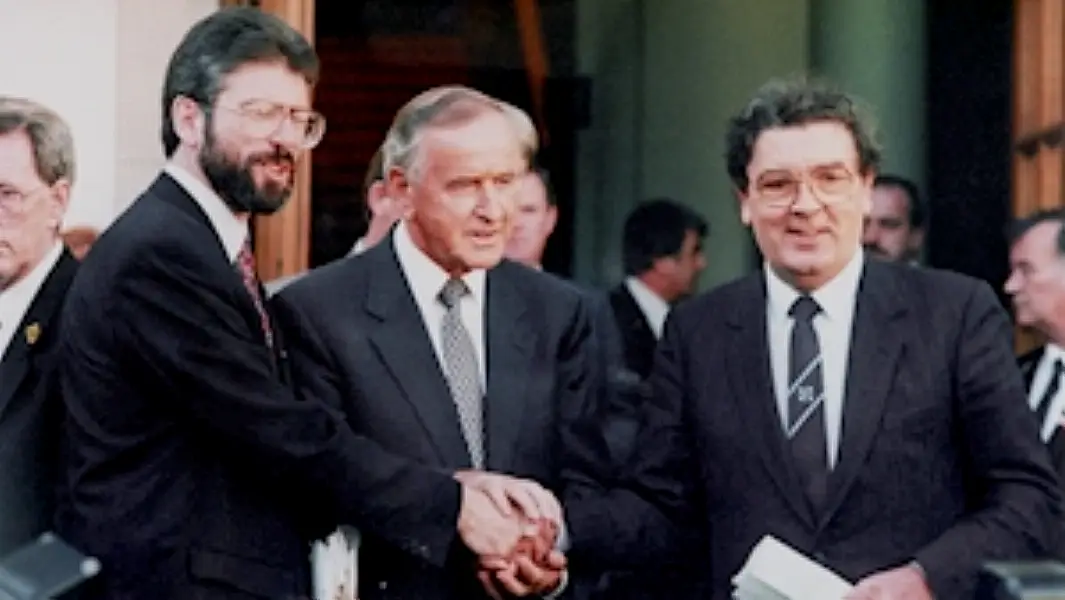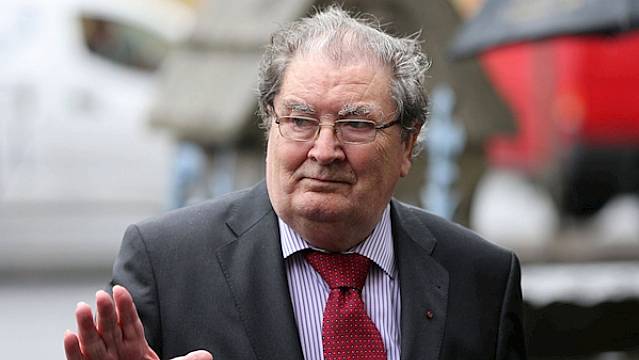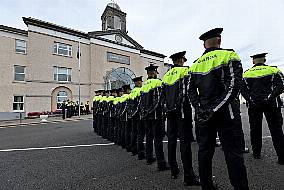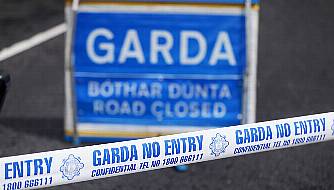Mr Hume passed away in the early hours of Monday morning after a short illness, according to his family.
The former Foyle MP had dementia and was cared for in the Owen Mor nursing home in Derry.
In a statement, the family said: "We would like to extend our deepest and heartfelt thanks to the care and nursing staff of Owen Mor nursing home in Derry. We would like also to extend our gratitude to the people of Derry and Moville/Greencastle, who have looked after John and shown us so much kindness as his dementia has progressed.
"Celebrating community in all its diversity went to the heart of John’s political ethos and we are very appreciative that our communities supported, respected and protected John."
The family said the funeral will be arranged according to the current government regulations with very strict rules on numbers. “It seems particularly apt for these strange and fearful days to remember the phrase that gave hope to John and so many of us through dark times: we shall overcome.”
In 1998, after all-party negotiations at last produced the Belfast Agreement, Hume and David Trimble jointly received the Nobel Peace Prize. Regarded as one of the key architects of the peace process he received numerous accolades for his efforts to promote peace. Hume was instrumental in talks between the British and Irish governments and Sinn Féin that led to the 1994 IRA ceasfire and ultimately to the brokering of the Belfast Agreement.
Peace maker
Paying tribute to Mr Hume, Taoiseach Micheál Martin said he was "a great hero and a true peace maker".
“During the darkest days of paramilitary terrorism and sectarian strife, he kept hope alive. And with patience, resilience and unswerving commitment, he triumphed and delivered a victory for peace.
“While the 1998 Good Friday Agreement was the product of many people’s work, can anyone really claim that it would have happened without John Hume? He didn’t just talk about peace, he worked unstintingly for peace, at times in the face of the most virulent criticism and risk to his life. He knew that to be a peace maker on this island meant being a risk taker," he said.
Their grief will be great but they can take pride in the knowledge that they have shared their life with one of the greatest Irish people that ever lived.
Advertisement
“I extend my sympathies to his wife Pat and his five children Aine, Therese, John jnr, Aidan, and Mo. Their grief will be great but they can take pride in the knowledge that they have shared their life with one of the greatest Irish people that ever lived. All people on this island will give thanks for his life.”
President Michael D Higgins said John Hume had a willingness to listen to what was often difficult to accept. He said he transformed and remodelled politics in Ireland and d we should all be grateful that we had such a person as John Hume to create a light of hope in difficult times.
Former Sinn Féin president Gerry Adams descrived Hume as a “giant in Irish politics”. “I have to say on this sad day we wouldn’t have the peace that we enjoy today if it wasn’t for John Hume.”
Former US president Bill Clinton paid tribute to his peace maker friend John Hume who “forged peace in Northern Ireland”. In a joint statement with his wife Hillary, Mr Clinton described the former SDLP leader as having fought a long war for peace. “His chosen weapon: an unshakeable commitment to non-violence, persistence, kindness and love. With his enduring sense of honour he kept marching on against all odds towards a brighter future for all the children of Northern Ireland,” they said.
Through his faith in principled compromise, and his ability to see his adversaries as human beings, John Hume helped forge the peace that has held to this day. My full statement on my friend's passing here: https://t.co/JZ42lwYWFR
— Bill Clinton (@BillClinton) August 3, 2020
“Through his faith in principled compromise, and his ability to see his adversaries as human beings, John helped forge the peace that has held to this day.”
Irish unity
Born in Derry in 1937, he entered politics in 1973 and was elected MP for Foyle in 1983. A founding member of the Social Democratic and Labour Party (SDLP), he succeeded Gerry Fitt as its leader in 1979. He went on to serve as an MEP.
Hume spent his entire political career working to create a united Ireland. But he is best known for his efforts to secure the Belfast Agreement in 1998.
In 1993 he drew up proposals with Sinn Féin's Gerry Adams which they passed to the Irish government saying these could form the basis for a lasting peace in Ireland. In 1997 his efforts were finally rewarded when in July the IRA announced the renewal of its 1994 ceasefire.

Political talks ensued which eventually led to the signing of the Belfast Agreement in 1998. Unionist politicians viewed Mr Hume as just as dangerous to their cause as the IRA.
Solution
Educated and eloquent, he enunciated the case of constitutional nationalism. Mr Hume articulated the feelings of the ever-growing Catholic middle-class and early on constructed a theory which changed little over the years – that the heart of the Irish question lay not with the British but with the Ulster Protestants and that partition was not the cause of division but a symptom of it.
A solution to the age-old problem could only be found with agreement from the Protestants. Their numbers gave them a veto and they could not be forced into any new arrangement against their will, he argued.
The issue was no long one about winning or losing, but about sharing or choosing not to share. In practical terms, he won the argument.
In a tribute this morning, former taoiseach John Bruton said Hume reframed the problem from being one about who held sovereignty over land, to being one about people, and how they related to one another.
“The issue was no long one about winning or losing, but about sharing or choosing not to share. In practical terms, he won the argument. That is why we have peace today.”
Hume came from the first generation to benefit from the 1944 Education Act and went to the local grammar school, St Columb’s College. He went on to Maynooth College, the Catholic seminary near Dublin, to study French and modern history before returning to teach in his old school. In 1960 he married his wife Pat, had five children and continued to live in the Bogside area of Derry despite regular attacks on his home.
His involvement in the 1960s with the Credit Union movement brought him into contact with the issues of the day, housing and anti-Catholic discrimination in a city where Protestants were in the minority but boundary gerrymandering gave them a Unionist majority on the local council.
Speaking on Monday, Sinn Féin's Gerry Adams said: “I think what was significant was he was a Derry man, so he wasn’t in an ivory tower, he wasn’t in a little bubble, he was presented by Father Alex Reid with the possibility that if we could shape an alternative, we could shape a new political dispensation. And being given that possibility, he then bent his will over a long time to create with me and other what we now have.”
Political career
He first came to political prominence in the civil rights movement in 1968. His reputation for non-violence was established on the streets.
In 1970 he was one of the founding fathers of the SDLP and soon emerged as its chief policymaker. He became leader in 1979.
He was elected to the 1973-74 Northern Ireland Assembly and was head of the Department of Commerce in the ill-fated power-sharing executive in 1974. He was also elected to the 1982-86 Northern Ireland Convention.
He was elected as one of Northern Ireland’s three MEPs in 1979 and made it to Westminster in 1983 when boundary changes created the new Foyle seat, the first time a non-Unionist had got a seat in parliament for Londonderry since the establishment of Northern Ireland.
He was seen as the main architect of the Anglo-Irish Agreement signed between the British and Irish Governments in 1985 and which, much to Unionist fury, gave Dublin a say in the affairs of Northern Ireland.
Mr Hume led his party in various talks with the British Government and other local parties during efforts to set up a devolved administration.

Following extensive and often heated discussions, the Belfast Agreement was signed on April 10th, 1998. Devolved government followed with a local Assembly sitting at Stormont led by Ulster Unionist leader David Trimble.
Many had expected Mr Hume to become deputy first minister as the leader of the then second largest party. But instead Seamus Mallon took on that role, amid rumours of a bad working relationship between Mr Hume and Mr Trimble.
In 1998, Mr Hume won the Nobel Peace Prize, jointly with Mr Trimble. He built up a reputation as an international politician, winning the ear of Dublin, European leaders and, possibly most important of all, the powerful Irish-American lobby.
Within Europe he spearheaded economic initiatives which won Northern Ireland special financial aid, and fellow MEP and arch political foe, the Rev Ian Paisley, lined up in support.
He was also a recipient of the Gandhi Peace Prize and the Martin Luther King Award.
In the summer of 1999, Mr Hume was taken ill at a conference in Austria, and had to undergo a series of operations.
He retired as leader of the SDLP in 2001, succeeded by fellow Derry man Mark Durkan.
He announced his retirement from politics in 2004.
His Foyle Westminster seat was successfully defended in 2005 by Durkan.
However, Mr Hume’s party and the UUP suffered electorally since the signing of the Belfast Agreement, overtaken by Sinn Féin and the DUP.
It was a sad moment for the SDLP in June 2017 when Mr Hume’s former seat in Foyle was lost to Sinn Féin, along with South Down and South Belfast, leaving them without any MPs.
In 2010 he was named Ireland’s Greatest in a public poll by RTÉ.
In 2012, Pope Benedict XVI made him a Knight Commander of the Papal Order of St Gregory the Great.







